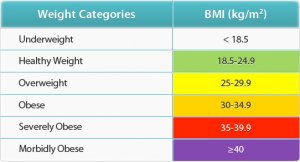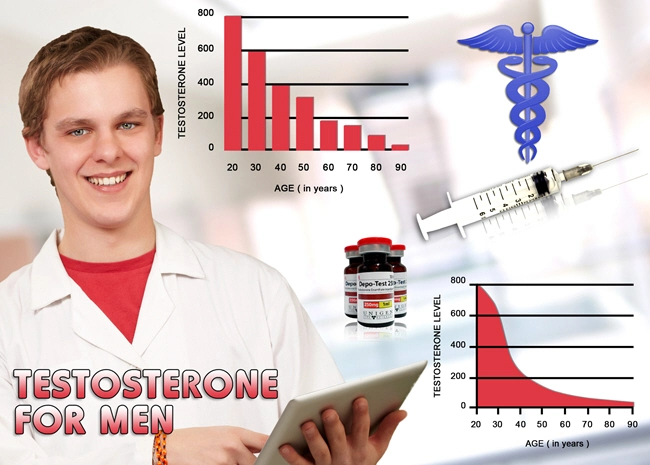
Video Link: https://vimeo.com/255867304
Video Download: Click Here To Download Video
Video Stream: Click Here To Stream Video
LabCorp Announces a Change to the Testosterone Reference Range
 When you receive the results of a blood test, the numerical result will come with an average range that consists of two numbers: one low and the other high.
When you receive the results of a blood test, the numerical result will come with an average range that consists of two numbers: one low and the other high.
The goal is to have your number fall in-between both figures, and place you in the “reference range,” also called the “normal range."
This figure is essential since your doctor will question anything outside of the normal range. Makes sense, right? So far, so good.
However, LabCorp, the largest clinical laboratory in America, recently lowered the testosterone reference range for men from 348-1,197 ng/dl to 264-916 ng/dl.
A quick glance will tell you the obvious: the range has shifted lower.
This Has Huge Implications for Men with Low Testosterone
 The higher average range had been the standard measure of testosterone for decades. So why would LabCorp decide to lower the range?
The higher average range had been the standard measure of testosterone for decades. So why would LabCorp decide to lower the range?
The company gives two reasons for the reduced ranges.
First, the Center for Disease Control (CDC) has standardized the method used for measuring testosterone. This change was due to several labs using a broad range of measuring techniques, which resulted in wildly differing results.
Second, and more telling, LabCorp stated that the new numbers “reflects a difference in average subjects with higher BMI’s.” This is chilling and needs to be explained in detail.
The theory and reasoning behind the standard ranges in blood testing are that 95% of folks considered healthy will fall between that range. And herein lies the rub.
This new standard for healthy testosterone levels uses that same reasoning. However, this leads to a controversial question: precisely what is considered “healthy?”
The Body Mass Index (BMI) is a widely-used measure of health computed by dividing your weight (either pounds or kilograms) by your height in either inches or centimeters. This will give a number, and here is a chart for interpreting this figure:
 The BMI is not without its critics, who insist that it is far from being a perfect health metric.
The BMI is not without its critics, who insist that it is far from being a perfect health metric.
For starters, it merely looks at weight and does not consider muscle mass.
This could result in both a bodybuilder and a couch potato both 6’ tall and weighing 225 pounds being classified as obese in spite of the bodybuilder having only 6% body fat, while the couch potato has 20% body fat!
Also, the BMI ignores ethnicity.
Folks with Asian or Native American genes are at a higher risk for a disease even if their BMI numbers are lower.
Still another problem with relying on the BMI index when considering what is low testosterone is this: the new lower range comes from a study titled Harmonized References Ranges for Circulating Testosterone Levels in Men of Four Cohort Studies in the United States and Europe.
The problem with that study?
Low testosterone (“Low-T”) is associated with fat men, so the study only measured non-obese men. However, just because a man is not obese does not automatically qualify him for the label “healthy.”
Look at the BMI chart.

Any number over 25 is considered overweight, and inactive men with a BMI in the so-called healthy range may still have high levels of body fat. This is the comparison measure for you and everyone else.
There’s no question that testosterone rates have cratered in the last several decades. Junk food, physical inactivity, environmental toxins -- the list of suspects goes on and on.
But regardless of the reasons for the explosive growth of the number of men suffering from Low-T, the bottom line is this: when your testosterone levels are measured, you are compared to a mob of men who break many, if not all, of the rules of good health. Regrettably, this is the new normal.
How This Directly Affects You
When it comes to blood testing, LabCorp’s influence is gigantic; the 800-pound gorilla, the big whale. What they say and do spills over to other labs, physicians, and insurance companies.
Therefore, unless your testosterone level is lower than a puny 264 ng/dl, you are not considered to need treatment for Low-T.
This gives your doctor a reason not to prescribe it and your insurance company a reason not to pay for it.
This is Why You Need Our Clinic
Our clinic DOES NOT accept these new numbers as the final determination of your healthy testosterone level.
We WILL NOT compare you to the vast number of men who have steadfastly refused to care for their bodies.
of men who have steadfastly refused to care for their bodies.
Your low testosterone diagnosis will be accurate, and only then will we proceed.
We will treat you like the individual you are, not just a number.
We will design a comprehensive program to restore your testosterone to its activity levels in a safe, efficient, and secure manner.
Our treatment for low testosterone is cutting-edge, and we will leave no stone unturned in renewing and maintaining your optimum health.
You must educate yourself, or be at the mercy of an authoritarian, paid-off, impersonal medical system that increasingly sees patients as walking dollar signs. Never, ever believe that merely not being sick is being healthy.
Just go out in public and look around. Ordinary people are overweight, unhealthy couch potatoes, just waiting for a severe disease to strike them like an asteroid hurtling toward the earth.
 In contemporary America, ordinary means shoveling down junk food, swallowing anti-depressants like popcorn, plates of prescription drugs to deal with a broad range of health issues, sugar addiction, never working out and amusing themselves to death with television and constant texting.
In contemporary America, ordinary means shoveling down junk food, swallowing anti-depressants like popcorn, plates of prescription drugs to deal with a broad range of health issues, sugar addiction, never working out and amusing themselves to death with television and constant texting.
You don’t have to join the ranks of “the new normal.” Contact us.
Reference
TESTOSTERONE REFERENCE INTERVAL CHANGES (ADULT MALES)
https://www.labcorp.com/assets/11476
Contact Us Today For A Free Consultation
Dear Patient,
Once you have completing the above contact form, for security purposes and confirmation, please confirm your information by calling us.
Please call now: 1-800-380-5339.
Welcoming You To Our Clinic, Professor Tom Henderson.

- Important Facts About Testosterone Therapy Before Buying [Last Updated On: May 13th, 2024] [Originally Added On: July 13th, 2019]
- Soy: Does it Lower Testosterone? [Last Updated On: October 18th, 2024] [Originally Added On: August 30th, 2020]
- Testosterone Treatments May Successfully Reverse Type-2 Diabetes in Some Men [Last Updated On: May 10th, 2024] [Originally Added On: November 13th, 2020]
- Testosterone Replacement Therapy (TRT) May Prevent Heart Attacks and Diabetes [Last Updated On: May 16th, 2024] [Originally Added On: November 17th, 2020]
- Did You Know? Recent Studies Have Confirmed the Link Between Low Testosterone (“Low-T”) and Depression. [Last Updated On: May 12th, 2024] [Originally Added On: January 10th, 2021]
- New Study Finds Testosterone Does Not Increase Your Heart Attack Risk [Last Updated On: May 9th, 2024] [Originally Added On: January 11th, 2021]
- The Great Testosterone Debate [Last Updated On: May 15th, 2024] [Originally Added On: January 14th, 2021]
- Testosterone Replacement Therapy Lowers Heart Attack Risk [Last Updated On: May 14th, 2024] [Originally Added On: January 18th, 2021]
- New Study Says: The Benefits of Testosterone Replacement Therapy Outweigh The Risks [Last Updated On: May 17th, 2024] [Originally Added On: January 19th, 2021]
- Male Menopause. Fact or Fiction ? [Last Updated On: May 18th, 2024] [Originally Added On: January 20th, 2021]
- Testosterone: How Much Do You Really Know About This Masculine Hormone? [Last Updated On: October 6th, 2024] [Originally Added On: February 9th, 2021]
- Low-T: What are healthy levels of Testosterone and why is it difficult to measure? [Last Updated On: August 10th, 2024] [Originally Added On: April 3rd, 2021]
- Testosterone Therapy May Be Good for the Heart if You Have Low-T [Last Updated On: May 27th, 2024] [Originally Added On: July 21st, 2021]
- A Recent Study Concludes: Testosterone DOES NOT Cause Prostate Cancer [Last Updated On: August 14th, 2024] [Originally Added On: August 16th, 2021]
- In the Battle Against Aging, When do the Risks Outweigh the Rewards? [Last Updated On: May 1st, 2024] [Originally Added On: August 18th, 2021]
- New Study Concludes: Boosting Testosterone Levels Lowers Men's Death Risk [Last Updated On: June 2nd, 2024] [Originally Added On: August 20th, 2021]
- Testosterone Replacement Therapy Slows Prostate Cancer! [Last Updated On: April 29th, 2024] [Originally Added On: September 13th, 2021]
- Research proves that Testosterone Therapy Boosts Fertility! [Last Updated On: May 2nd, 2024] [Originally Added On: September 26th, 2021]
- Free Testosterone and Sex Hormone-Binding Globulin [Last Updated On: May 3rd, 2024] [Originally Added On: October 15th, 2021]
- Testosterone Does Not Cause Heart Attacks [Last Updated On: May 4th, 2024] [Originally Added On: October 15th, 2021]
- Testosterone and Women [Last Updated On: May 5th, 2024] [Originally Added On: October 15th, 2021]
- Testosterone and Metabolic Syndrome [Last Updated On: April 30th, 2024] [Originally Added On: October 15th, 2021]
- Testosterone and Disease Prevention [Last Updated On: April 27th, 2024] [Originally Added On: October 15th, 2021]
- Judge Vacates $140 Million Verdict in Testosterone Lawsuit [Last Updated On: April 28th, 2024] [Originally Added On: October 15th, 2021]
- Testosterone and Estrogen [Last Updated On: May 6th, 2024] [Originally Added On: October 16th, 2021]
- Testosterone and Aging [Last Updated On: May 7th, 2024] [Originally Added On: October 16th, 2021]
- Testosterone Replacement Therapy (TRT) Benefits [Last Updated On: May 8th, 2024] [Originally Added On: October 16th, 2021]
- Testosterone and Male Menopause [Last Updated On: April 26th, 2024] [Originally Added On: October 16th, 2021]
- Testosterone Battles Obesity [Last Updated On: April 25th, 2024] [Originally Added On: October 16th, 2021]
- Why You Need Testosterone Replacement Therapy [Last Updated On: June 5th, 2024] [Originally Added On: October 16th, 2021]
- Testosterone FAQ's [Last Updated On: June 4th, 2024] [Originally Added On: October 25th, 2021]
- How Testosterone Impacts Sexual Preferences In Men and Women [Last Updated On: April 24th, 2024] [Originally Added On: October 30th, 2021]
- Growth Hormone and The Thyroid Gland [Last Updated On: May 19th, 2024] [Originally Added On: November 19th, 2021]
- How Does Masturbation Affect Testosterone Levels? Exploring the Science [Last Updated On: June 15th, 2024] [Originally Added On: March 27th, 2022]
- Testosterone Therapy Increasingly Used to Help Men Take Control of Aging [Last Updated On: June 16th, 2024] [Originally Added On: May 30th, 2022]
- The many benefits of Testosterone Replacement Therapy (TRT) [Last Updated On: October 1st, 2024] [Originally Added On: June 13th, 2022]
- Tlando Testosterone - A Brand New Way to Treat Low-T Safely with a Testosterone Pill [Last Updated On: June 19th, 2024] [Originally Added On: July 12th, 2022]
- Safe Tlando Testosterone Changes Landscape of Low-T Therapy [Last Updated On: June 21st, 2024] [Originally Added On: August 15th, 2022]
- Systems to Monitor Testosterone Replacement Therapy (TRT) [Last Updated On: September 11th, 2024] [Originally Added On: September 21st, 2022]
- Testosterone May Help You Keep Your Job (Or Find Another) [Last Updated On: July 4th, 2024] [Originally Added On: October 4th, 2022]
- Toxic Chemicals are Killing your testosterone…And your Manhood! [Last Updated On: October 28th, 2024] [Originally Added On: October 10th, 2022]
- A new study reveals that Testosterone improves body composition in men with low testosterone! [Last Updated On: September 21st, 2024] [Originally Added On: October 17th, 2022]
- A former Mr. Olympia speaks about testosterone [Last Updated On: September 9th, 2024] [Originally Added On: November 8th, 2022]
- Testosterone Blockers Thwart Melanoma [Last Updated On: July 1st, 2024] [Originally Added On: December 11th, 2022]









